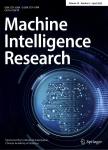版权所有:内蒙古大学图书馆 技术提供:维普资讯• 智图
内蒙古自治区呼和浩特市赛罕区大学西街235号 邮编: 010021

作者机构:Univ Chinese Acad Sci UCAS Sch Artificial Intelligence Beijing 100049 Peoples R China Chinese Acad Sci CASIA Inst Automat Natl Lab Pattern Recognit NLPR Beijing 100190 Peoples R China
出 版 物:《MACHINE INTELLIGENCE RESEARCH》 (Mach. Intell. Res.)
年 卷 期:2025年第22卷第3期
页 面:511-523页
核心收录:
基 金:Beijing Natural Science Foundation, China [L221013] National Science Foundation of China [U20B2070, 61832016]
主 题:Semi-supervised few-shot learning few-shot learning pseudo-labeling linear regression low-rank reconstruction
摘 要:Few-shot learning attempts to identify novel categories by exploiting limited labeled training data, while the performances of existing methods still have much room for improvement. Thanks to a very low cost, many recent methods resort to additional unlabeled training data to boost performance, known as semi-supervised few-shot learning (SSFSL). The general idea of SSFSL methods is to first generate pseudo labels for all unlabeled data and then augment the labeled training set with selected pseudo-labeled data. However, almost all previous SSFSL methods only take supervision signal from pseudo-labeling, ignoring that the distribution of training data can also be utilized as an effective unsupervised regularization. In this paper, we propose a simple yet effective SSFSL method named feature reconstruction based regression method (TENET), which takes low-rank feature reconstruction as the unsupervised objective function and pseudo labels as the supervised constraint. We provide several theoretical insights on why TENET can mitigate overfitting on low-quality training data, and why it can enhance the robustness against inaccurate pseudo labels. Extensive experiments on four popular datasets validate the effectiveness of TENET.